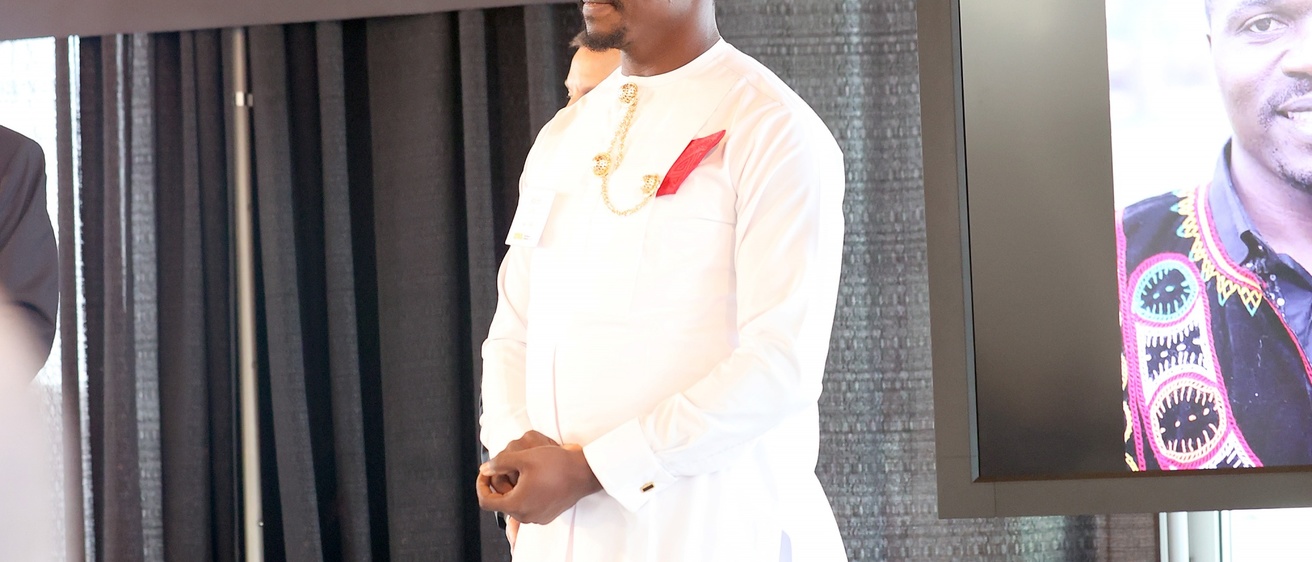By DARREN MILLER
Communications Specialist, Iowa JPEC
Some of the earliest recollections for Atem Ernest Lefu — before he was old enough to attend school — were accompanying his father and mother to a farm where he got an up-close initiation into the work ethic necessary to get by in Cameroon.
The west-central African country of 28 million people is known for football (soccer), agriculture, and entrepreneurs.
“Everyone is fighting to get out of poverty, so the youth are very entrepreneurial,” said Atem, who received the 2021 International Entrepreneurship Impact Award from the Institute for International Business and the University of Iowa John Pappajohn Entrepreneurial Center (Iowa JPEC).
After watching his parents toil on the farm for nearly a decade, Atem was confused by the end result. His parents were hard workers and they had little difficulty selling their produce. But even then, there was no money left to pay Atem’s school fees.
“I kept asking the question, why do farmers work so hard, yet they are still very poor?” Atem said.
He searched for answers in an attempt to create a better life for farmers like his parents.
“The problem farmers face is access to markets,” Atem said.
As a result, Atem founded Agro-Hub, one of the fastest-growing agri-tech startups in Africa. The company works with more than 61,000 farmers across 300 communities, helping cassava farmers increase productivity while creating processing factories that buy cassava directly from farmers.
“The idea was to connect farmers directly to market,” Atem said. “My parents couldn’t get the good deal for their produce. Agro-Hub is all about sustainable and profitable markets.”
Success wasn’t instant for Atem. He quit his job as a business and grants development officer, teamed with three friends, and built an app that would help farmers reach consumers. Although the app looked good on paper, it was not successful. Atem worked out of an office in his dining room and after one year he lost every investment and went broke.
He shut down the app and moved on to Agro-Houses, where consumers went to a warehouse to pick up produce. That idea didn’t work because of perishability. Then Atem went to a supermarket model where farmers dropped produce off Monday and returned Friday for a check. That model was shut down as well.
After mis-firing on three shots at his entrepreneurial goal, Atem finally found the net after being introduced to Iowa JPEC.
“Coming to Iowa was an eye-opener,” he said. “I hit rock bottom with my company; I had a lot of issues with management and I didn’t know how to sort it out. I got involved with the Venture School and I learned a lot of things, especially with the leadership and business classes. It made me revisit my business entirely.”
Atem pivoted to a value chain approach highlighting cassava, a nutty-flavored starchy vegetable that is eaten by 7-8 million people in Cameroon every day. It was a perfect match since so many farmers in Cameroon harvest that crop. After years of searching and struggle, Atem had finally discovered the right business model to create sustainable and profitable markets.
The move generated huge prospects for farmers and led to signing a deal to sell cassava flour to Nestle, the largest food company in the world, headquartered in Switzerland.
“Agriculture is a gold mine,” Atem said. “People must eat. Without food there is no life, and without agriculture there is no food. There comes a time when any rightful-thinking entrepreneur in the agricultural space should be looking at these opportunities and looking at technologies that could be applied to make life easy and help feed the world.”
An obvious lesson Atem learned while developing Agro-Hub was to never give up. He lost money three times and spent many nights squatting on a friend’s couch. Another lesson was the importance of consistency.
“If you are consistent in what you do and you keep doing it, there is no way you are not going to succeed,” he said. “I didn’t become an expert overnight; I was just consistent in what I was doing.”
Atem has opened an office in Nigeria, where he rents a greenhouse and is looking for markets for vegetable, poultry, and fish farmers.
“God has a way of doing things,” he said. “He sends you the right kind of people you need at the right time.”
For Atem, those “right kind of people” were found within Iowa JPEC.
